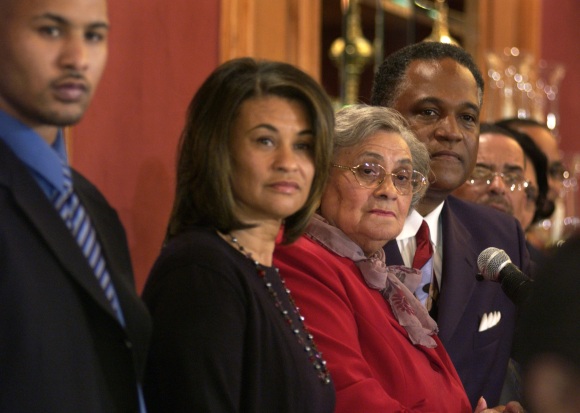I know a thing or two because I've seen a thing or two.
I mention this not only because I know what I saw happen during last year's election, but also because of something Haley Barbour of Mississippi said several years ago.
And because I fear for the future of the American Republic. I fear for our future because one of our two political parties exhibits contempt for the practices and objectives of democracy.
A few years ago, Mississippi's governor, Haley Barbour, aroused controversy by his claim that "things weren't that bad" in his home town of Yazoo City, MS during the civil rights movement, and that the White Citizen's Council played a helpful role in peaceful integration.
Haley Barbour was wrong. Not only that, he did a disservice to his home town, his county, and his state by failing to recognize that despite very real danger, courageous citizens of Yazoo County and neighboring Holmes County did play a helpful role in integration. There was, for example, Hazel Brannon Smith, the courageous owner and editor of the the Lexington Advertiser, in Holmes County, just north of Yazoo County. Her account here of the formation of the White Citizen's Council and its purposes and methods gives the lie to Barbour's more rose colored recollections.
In 1955 in Holmes County, the White Citizen's Council, together with the County Sheriff, ran the leaders of an interracial cooperative farm near Cruger out of the county. Here is a brief account of that event. For a more detailed account, see Providence by Will D. Campbell.
I know Yazoo City (pronounced "yeh-zoo", not "yah-zoo"). My father and younger brother were born there. My parents, grandparents, great grandparents and great aunts and great uncles are buried in Glenwood Cemetery there. Other relatives are buried at the cemetery at Fletcher's Chapel about five miles southeast of Yazoo City. My grandmother took me there once to see the yankee cannon ball embedded in the chapel's wall.
I'm about ten years older than Governor Barbour. Even so, he would have to have been totally oblivious as a young man not to know what the White Citizen's Council was up to.
It is true, so far as I know, that Citizen's Councils did not directly organize any murders. Those episodes (Emmett Till, Schwerner, Goodman and Chaney, and others) seem to have been done by the Klan. But as a result of Citizen's Councils efforts, many Black Citizens lost their livelihoods. The Citizens Councils published names of Black citizens who actively sought their civil rights, including the right to vote. Members of the Klan and others of a violent inclination knew what to do with that information.
Nor was the Citizen's Council only interested in Black activists. They worked closely with the Mississippi State Sovereignty Commission to harass and intimidate white citizens receptive to integration. I know this because I was one of their targets during my student years at Ole Miss.
The White Citizen's Councils never supported integration, peaceful or otherwise. As the White Citizen's Council newspaper explained in a front page article in 1956, "integration is a Communist - Jewish conspiracy to mongrelize the human race."
When Haley Barbour of Yazoo City, (where my father was born in 1915 and my brother in 1941) was appointed Chair of the Republican National Committee in 1993, astonished journalists in DC asked Barbour if it didn't seem surprising for someone from the deep and formerly solid South to be Chair of the RNC, Barbour's answer: "not at all! Where Mississippi has been is where the country is headed."
I thought that, if he was right, this was an ominous foreboding. .
Oriental resident (or former resident gone cruising) Tony Tharp, called attention to an article in the Jackson Clarion Ledger blog site describing just where Mississippi's footsteps might lead. Tony, a native son of the Mississippi Delta (near Leland, MS along US Highway 82), often reflects on past and current developments in the state.
Donald Trump exploited all of the old racial fears of white people in last year's campaign, as did Ronald Reagan before him in 1980.
Russia is pushing the same agenda of white supremacy.
Let's stop sweeping this stuff under the rug.
I thought that, if he was right, this was an ominous foreboding. .
Oriental resident (or former resident gone cruising) Tony Tharp, called attention to an article in the Jackson Clarion Ledger blog site describing just where Mississippi's footsteps might lead. Tony, a native son of the Mississippi Delta (near Leland, MS along US Highway 82), often reflects on past and current developments in the state.
Donald Trump exploited all of the old racial fears of white people in last year's campaign, as did Ronald Reagan before him in 1980.
Russia is pushing the same agenda of white supremacy.
Let's stop sweeping this stuff under the rug.





